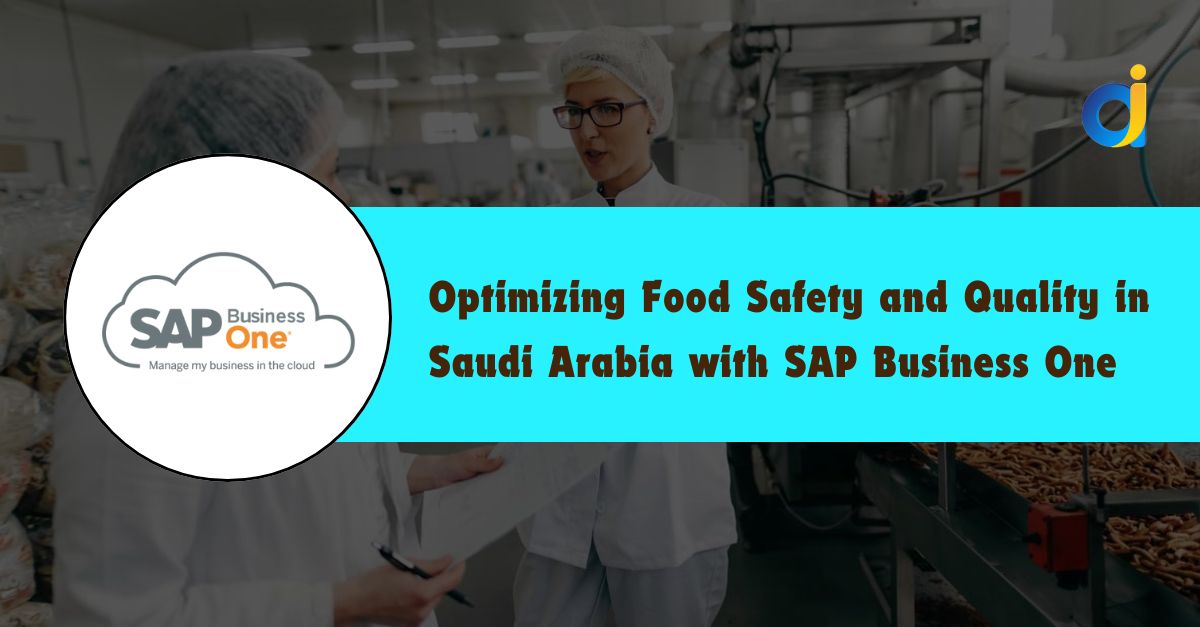In Saudi Arabia, ensuring food safety and quality is a pressing challenge for businesses in the food sector. Companies are searching for effective ways to manage supply chains and adhere to rigorous regulatory compliance standards.
SAP Business One offers a dynamic solution, providing enterprises with comprehensive tools to address these issues head-on.
A key fact about SAP Business One is its ability to offer real-time visibility and control over production and distribution processes. This system simplifies complex tasks such as inventory management, recipe management, and adherence to quality standards.
Our article will guide readers through optimising food safety protocols using SAP Business One’s suite of features designed specifically for the food industry in Saudi Arabia. Stay informed on safeguarding your products’ integrity from farm to fork.
Read on.

Key Takeaways
- SAP Business One helps food companies in Saudi Arabia see every step of their process and make fast decisions. This software tracks operations in real-time, helping to manage inventory and follow safety rules.
- The system includes Quality Management tools that check food quality and help businesses stick to important health standards. These tools also keep track of safety checks and can use digital signatures for records.
- By using SAP Business One, companies can manage recipes easily, save money by reducing waste, and always have the right amount of stock. Success stories from Saudi Arabia show that this software makes it easier to meet high-food safety standards while cutting costs.
Key Features of SAP Business One Enhancing Food Safety

SAP Business One helps food companies in Saudi Arabia see their operations clearly and control them better. This software makes sure companies follow food safety rules and keep up quality.
Real-time Visibility and Control
SAP Business One enables companies to see every part of their food production and distribution in real-time. This means you can track all your operations, from supply chain management to inventory control, without delays.
It gives managers the power to make fast decisions based on what’s happening right now in their business. For instance, if there’s a sudden change in raw materials quality or a delay in the supply chain, they can spot it immediately and act quickly.
This software also plays a vital role during product recalls. It helps identify which products are affected swiftly and manage the recall process efficiently to minimise risks to consumer health and safety.
With SAP Business One, businesses have found that managing audits becomes simpler too. Auditors can easily verify results by linking process orders with quality notifications for any deviations found during inspections.
With real-time visibility and control, SAP Business One transforms how food sector businesses operate, making them more responsive and resilient.
Quality Control and Compliance Adherence
SAP Quality Management (QM) tools make sure food makers follow strict quality and compliance rules. These tools help with keeping records for food safety checks. They check important parts of the making process to keep products safe and high quality.
Connecting SAP QM with upkeep tasks improves inspections and makes sure items are safe and work well. SAP also supports digital signatures to meet 21 CFR PART 11 requirements.
This system helps businesses manage health & safety standards, making sure they avoid fines for not following rules. By using SAP software, companies can handle customer complaints faster through corrective and preventive actions, ensuring high-quality products reach their customers every time.
Now let’s look into how this impacts recipe management within the sector.
Benefits of Implementing SAP Business One in the Food Sector
Using SAP Business One helps food companies work smarter. It makes managing recipes and tracking inventory easy, cutting down on waste.
Streamlined Recipe Management
SAP Business One makes managing recipes easy. It helps food companies in Saudi Arabia create, change, and keep track of their recipes efficiently. This system ensures every recipe is up to date and follows safety rules.
Companies can make a new batch when they start making something based on the process order. They will have one plan for checking and all the data they need.
With SAP Business One, weighing before mixing gets better too. The system connects scales to its Quality Management (QM) feature and records results with digital signs. This matters because it meets strict rules for safety.
When mixing ingredients, workers take samples, note down findings, and if things aren’t right, they use Quality Notifications and Corrective and Preventative Actions (CAPA) to fix issues.
This way of handling recipes saves time and makes sure food quality stays high in Saudi Arabia’s competitive market.
Inventory Optimisation and Waste Reduction
SAP Business One helps businesses keep the right amount of stock. This means not too much or too little. It tracks items closely to use them well before they go bad. Companies save money because they throw away less food.
They also make sure they always have what customers want.
Using this system, companies get updates fast on their inventories. They know exactly how much material is in the warehouse and where it is. This makes it easier to plan and cuts down waste a lot.
For example, if a business knows it will sell 500 units of an item next month, SAP Business One helps make sure they have exactly that – no more, no less.
Silver Touch offers tools to help with these tasks. Their technology reduces leftovers by making better plans for batches and managing scraps smartly.
Case Studies: Success Stories from Saudi Arabia
In Saudi Arabia, food enterprises have achieved prosperity by utilising SAP Business One for more secure products. This software aided them in fulfilling rigorous health and safety regulations whilst overseeing numerous details.
Businesses could monitor ongoing events in real time across diverse locations. This ensured they consistently complied with quality standards with ease.
For instance, a reputed food distributor ameliorated its storage practices through this system. They minimised waste by supervising their inventory more efficiently. The business employed data to make more informed decisions regarding food quantity and the timing of new orders.
This saved cost and also maintained the high standard of food for customers.
Conclusion: Future Outlook for Food Safety and Quality with SAP Business One
Optimising food safety and quality in Saudi Arabia secures a bright future with SAP Business One. This software gives businesses control and sight over their entire process, from making to sending out food.
It ensures products meet high standards and laws. With features for managing recipes well, keeping track of inventory smartly, and cutting down waste, companies can serve better food to everyone.
Success stories in Saudi Arabia prove that using SAP Business One puts the food industry on a path towards safer practices and top-quality products for all.






